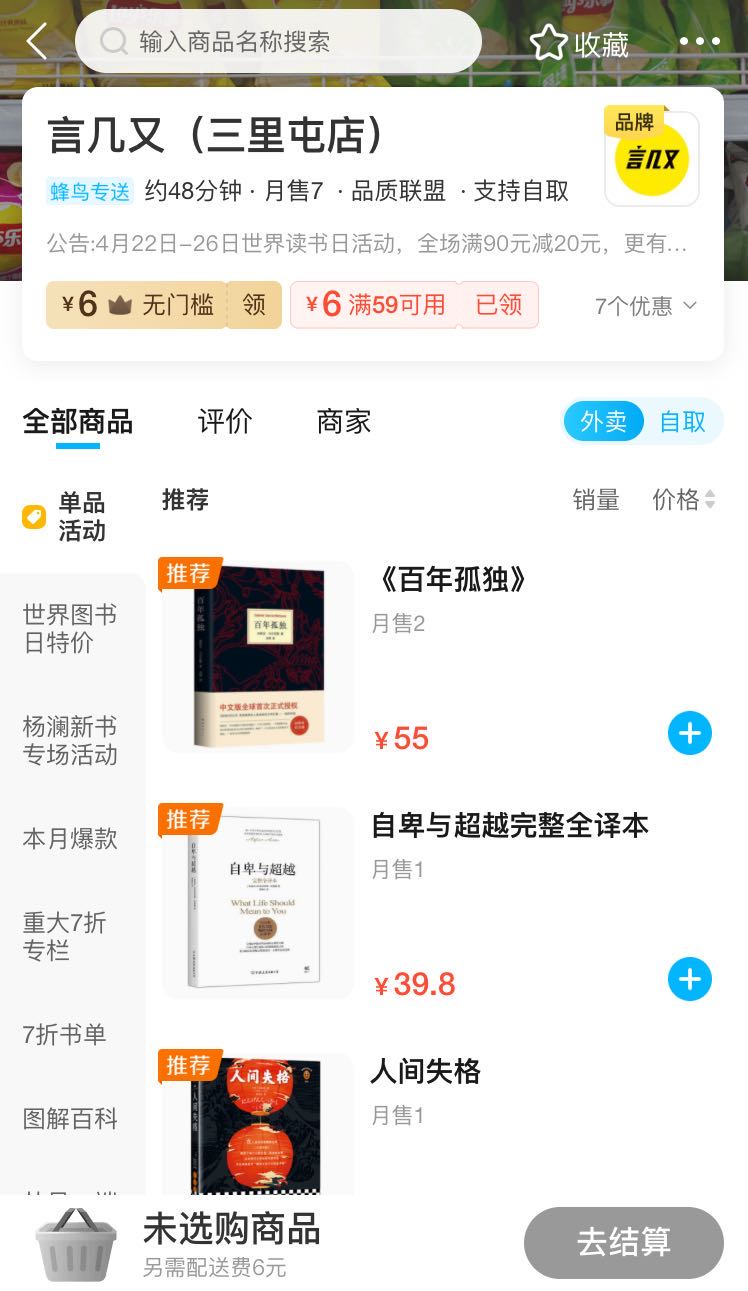"I have always imagined that Paradise will be a kind of library," said celebrated Argentine writer Jorge Luis Borges.
However, many bricks-and-mortar bookstores have been facing an unprecedented crisis since the COVID-19 pandemic, with some forced to shut down.
In February, more than 90 percent of bookstores said they were making almost no money, according to a survey of over 1,000 bricks-and-mortar bookstores conducted by Shudianxing, a Chinese bookstore Alliance. The survey also showed that just over 37 percent of bookstores have capital reserves that will last for less than one month.
But, the coronavirus pandemic has brought new chances for online business models. Some bookstores are trying to stay afloat by selling their products via livestreaming and cooperating with food delivery companies.
An online movement called "Spring of bookstores: Save our bricks-and-mortar bookstores" has called on celebrities for livestreaming, and been a hot topic online since April.

Screenshot of two hosts introducing books during a livestreaming session.
Screenshot of two hosts introducing books during a livestreaming session.
China's livestreaming boom
China's livestreaming market was worth 4.4 billion dollars in 2018, growing 37 percent on the year prior and attracting a total of 456 million viewers, according to professional services network Deloitte.
Makeup, food, home appliances and other common products all can be purchased by tapping on links on the screen. The practice can be considered an updated version of teleshopping, but no longer on TV. The biggest player in the space is Taobao, which belongs to Alibaba.
This "see now, buy now" model also applies to books.
Bai Yansong, a famous news anchor, was one of the first celebrities who supported the proposal "Spring of bookstores: Save our bricks-and-mortar bookstores." He hadn't shown up at a livestreaming session before.
The manager of "Beyond Book Story," a landmark bricks-and-mortar bookstore in Wuhan, said to a business media platform Insight that one livestreaming event can help sell over 4,000 yuan in books. The online studio's popularity peaked at 300,000 yuan on April 23, which is much higher than the performance of bricks-and-mortar bookstores.
Frequent livestreams aim to keep bookstores alive. They have not only provided book lovers with more convenience, but made a wide range of reading choices no further than a click away.
Apart from livestreaming, some bookstores have allied themselves with online food delivery companies to deliver books, such as food delivery giant Meituan.
Customers can order books online and have them delivered quickly, just like ordering takeout.

Customers can order books via a food delivery app.
Customers can order books via a food delivery app.
Expansion of the new online marketing model
The livestream shopping phenomenon had expanded outside of China before the pandemic. Kim Kardashian West sold 150,000 units of her KKW perfumes during a livestreaming session on Alibaba's Tmall last year.
Similar to Taobao, U.S. e-commerce giant Amazon launched online platform "Amazon Live," livestreaming video shows where hosts present specific products available on discount. Underneath each video, customers can view and buy the products discussed, ask questions and chat with the session hosts.
3,000 bags of coffee beans from the Rwanda Farmers Coffee Company were sold in a second on May 14's online promotion via livestreaming after Wei Ya, a Chinese internet celebrity, announced the start of auctioning to over 10 million viewers. This online marketing model has opened the gate to products from other countries.
While some have seized new opportunities presented because of the change COVID-19 has brought, others still have faith in the publishing industry. At the end of the day, some people love reading and the pandemic cannot alter this.
(Cover image by Li Wenyi)